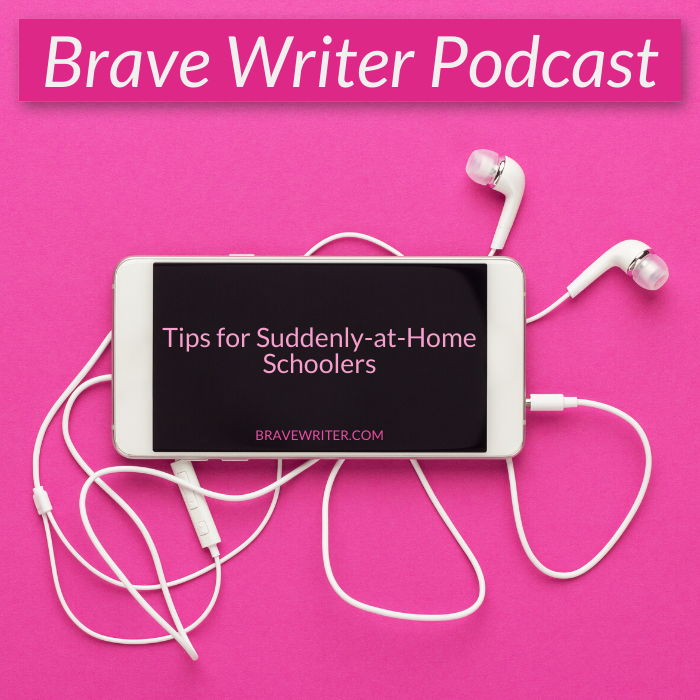Podcast: Suddenly-at-Home Schoolers

Let’s address this global, unique moment where homeschooling is suddenly center-stage and millions of families are experiencing a lifestyle change that is in some ways similar and in some ways different than the choice many of us made to do this homeschooling project.
The move from having kids in school to having their education thrust upon you is creating a serious amount of:
- anxiety,
- confusion, and
- disruption to ordinary life.
If that weren’t enough, parents who used to send their kids to school and then drive to an office are now also at home, trying to conduct a 40-hour workweek while they educate their children using a school system that they didn’t create.
What I want to do today is look at homeschooling as a philosophy, and looking at the dynamic of what happens when you combine working from home with education from home.
It is no easy thing to:
- be confined in your house,
- not have access to much of the entertainment and distractions we’re accustomed to, and
- be so uncertain about what the future holds.
For all of us in this conundrum, I want to talk about ways we can foster learning and play and cooperation while parents are trying to get their jobs done. I’m going to break this up into tips for those of us who are suddenly-at-home schoolers and then some tips for working from home while schooling.
Listen to the Podcast
Show Notes
Tips for Suddenly-at-Home Schoolers
You’re at home, not at school. Home is where you get to be yourself, relaxed, not pressured. School is where you perform for standards and follow the requirements of the institution. When you bring the school into the home, it’s a mismatch, which is why kids rebel against that feeling of imposed learning. What should we do instead when we are teaching, and learning, from home?
- Bring the properties of home to the learning. For instance, if you want to read with your kids, set a beautiful table, add muffins or treats, use the fancy teacups. Create a centerpiece of LEGO and then read aloud to your children: poetry, nursery rhymes, novels, picture books. The party atmosphere helps them to show up and be present to the learning you want them to experience.
- Take advantage of games to reinforce math skills. Dice, cards, Monopoly money, Battleship coordinates—all of these help kids naturally practice their calculating skills. The learning counts because it is real.
- Have Big Juicy Conversations — about the difference between a book and its movie version, something they’ve heard on the news, an event in history, and more! Kids learn the most when they get to express what they’re thinking about verbally to an interested adult.
- Re-read your favorite books. Rereading is one of the most powerful forms of learning—it allows you to see what you missed on the first pass, it allows children to increase the speed of their reading, it helps them to feel safe because they know the outcome of the story.
- Use your bodies! Since you are at home, let’s say there are drills for spelling or counting or math facts. Pull out a chair and put your child on it (standing). Then call out what is to be recited: “Count backward from 20!” Then countdown with your child and when your child gets to zero, shout “Blast off!” and have the child jump into a sea of pillows on the floor. Do this for multiplication tables, spelling words, reciting a poem, saying your ABCs and more.
Kids are learning all the time—your job is to simply notice what they are learning. Now is the time to jot down the conversation you had about the virus, the moment your child identified a bird at the feeder, when a child reread a book, when your child beat 6 levels of a video game today, when another child offered to write an email to grandma so she wouldn’t be lonely. These ALL count! Record them so you don’t forget.
Tips for Working from Home While Schooling
Invite the children to a huge brainstorming session. Get out the whiteboard or a sheet of paper and say these words:
“We have to work from home now to be able to keep our family going. You have schoolwork to complete. How on earth are we going to do all of this together? Let’s get all our ideas on the board.”
Write any idea on the board and test them. Treat them like experiments, not solutions, and see what works best.
For work time, set aside certain:
- toys,
- books,
- art supplies, or
- movies.
Make sure these only come out when you are going to work. Your children can look forward to work time if they know that it means something they love to do happens then.
Set a timer so they can know that you will stop when it goes off. Pace yourself—you may not get 8 straight hours. Take long breaks with your kids and re-up.
If both parents are home, work before your kids get up and all morning while the other parent runs herd. Then swap for the afternoon into the evening. Each parent can take a turn at leading the education during their time slot.
We can do this!
Let’s come out the other side of this stronger, more in love with our children, and more in sync with our partners.
I’m rooting for you.
Resources
- Want help getting started with Brave Writer? Head over to bravewriter.com/getting-started
- Sign up for the Brave Writer Newsletter to learn about all of the special offers we’re doing in 2020 + you’ll get a free 7-Day Writing Blitz guide just for signing up: http://go.bravewriter.com/writing-blitz
Connect
- Instagram: instagram.com/juliebravewriter
- Twitter: twitter.com/bravewriter
- Facebook: facebook.com/bravewriter


















